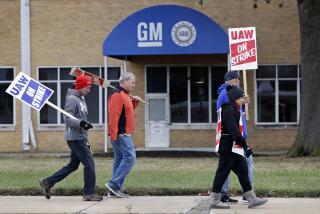GM Will Boost Pension Fund by $10 Billion
WASHINGTON — In a landmark deal between the nation’s largest corporation and the Clinton Administration, General Motors has agreed to pay $10 billion in cash and stock into its badly underfunded pension plan, the largest private plan in the country.
Labor Secretary Robert B. Reich said the agreement calls for GM to make the largest contribution to a private plan ever required of an American corporation. The $10 billion should be sufficient to shore up the fund, which covers more than 600,000 workers and retirees, for the next decade.
Reich said the arrangement is only the first step in the Administration’s efforts to overhaul the nation’s pension system before an S&L-style; crisis erupts, potentially prompting the need for a massive taxpayer-financed bailout.
Because the federal government guarantees payments to the nearly 41 million beneficiaries of private corporate pension plans, taxpayers could be liable if the corporations are unable to meet their obligations.
Underfunding of corporate plans has roughly doubled since 1987, and today the government’s potential liability has risen to $53 billion.
Many critics have argued that Congress and federal regulators have been lax in forcing corporations to maintain their pension funds at appropriate levels. Furthermore, pension obligations are likely to undergo explosive growth by the turn of the century, largely as a result of the onset of retirement for the oldest members of the Baby Boom generation.
Calls for reform of the federal government’s pension insurance system have increased recently as it has become clear that taxpayers’ potential liability far exceeds initial expectations.
Hoping to head off a crisis, the Administration has proposed legislation to reform the system. It would force corporations with underfunded plans to increase the premiums that they pay for federal insurance of their plans. It also would give regulators more power to force compliance and require corporations to provide more detailed information to workers and retirees about the financial health of their pension plans.
“There is no reason to panic now but legislation is necessary if we are to avoid a crisis in the future,” Reich said. The potential taxpayer liabilities from underfunded pension plans “is a serious problem and it’s growing worse. I don’t want to get into scaremongering by comparing this to the S&L; crisis, but we need to get a handle on this to get it under control.”
Reich said the problem must be dealt with while the economy is still growing. “The economy is now improving and this is the time to do it,” Reich said. “Let’s not wait until we have another downturn.”
Martin Slate, executive director of the Pension Benefit Guaranty Corp., the federal agency that regulates pension plans and guarantees benefit payments, noted that the agreement with General Motors should “make a substantial dent in the problem” of underfunded pension plans.
Although it will not solve the entire problem at GM--the auto maker faced a $22.3-billion shortfall in its pension plans at the end of last year--he said the new agreement at least allows the agency to “get a decade ahead of the problem.”
Under the agreement, GM said it will contribute to the fund $4 billion in cash and 177 million shares of GM Class E stock, worth more than $6 billion at current market prices. GM’s Class E shares are stock in its Dallas-based Electronic Data Systems subsidiary.
Terms of the agreement free the subsidiary of further liability for shortfalls in the pension system, if it is sold. In effect, that deal makes EDS more attractive to potential buyers.
In addition, GM agreed not to use any credit balances created by the infusion of funds in its pension plans for other purposes until 2003.
Earlier, GM had announced that it would agree to pay the $6 billion in stock into its pension fund but had not previously stated that it would be willing to place another $4 billion in cash into the plan as well.
At least $2 billion of the cash will be contributed at the same time as the stock contribution, with the balance to come no later than Sept. 30, 1995. GM also will continue to make its regular pension contributions, which will total $8 billion by 1996.
“GM’s willingness to contribute funding of this magnitude to its workers’ pensions is a welcome step,” Reich said. GM’s stock payments require approval of the Labor Department’s Pension and Welfare Benefits Administration, but officials said they expect the agreement to be completed later this year.
GM said the agreement represents a “major step” for the company in its efforts to cover its pension obligations. “We would like to see our plan pretty much funded before the next downturn,” in the auto industry, said Heidi Kunz, GM’s treasurer.






